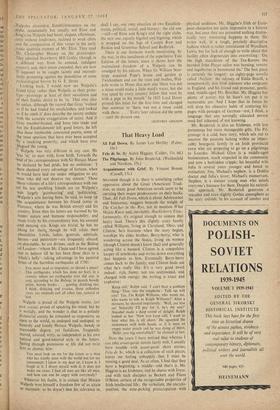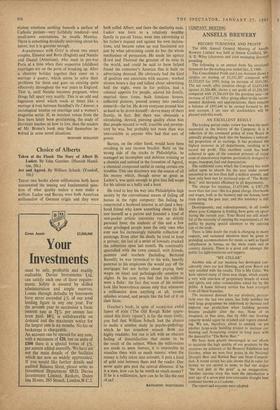That Heavy Load
Acquaintance with Grief. By Vincent Brome.
• (Cassell, I5s.)
SPLENDID though it is, there is something rather oppressive about the Great (American) Tradi- tion; so many good American novel's seem to be carrying their major predecessors on their backs. Thus, All Fall Down, which is about Adolescence and Innocence, staggers beneath the weight of The Catcher in the Rye, not,to mention What Maisie Knew and, inevitably, Huckleberry Finn: fortunately, it's original enough to. sustain that heavy load. There's this slightly crazy family called Williams, living in Cleveland, 'Ohio,. and Clinton, he's fourteen when the 'story begins, worships his elder brother, Berry-berry, who is wandering across the States, living on women (though Clinton doesn't know that) and generally acting like a bastard. Clinton is a compulsive keeper of notebooks and writes ,down everything that happens to him. Eventually Berry-berry conies back to the family, and Clinton finds out what he's really like. It's a very good novel indeed: rich, 'funny, not too sentimental, and charged with energy; the writing is exact and explosive: 'Keep still,' Ralph said. 'I can't hear a goddam thing.' Then, into the telephone: 'Talk tip, will you? Yes, I'm Ralph Williams, who wants me, who wants to talk to Ralph Williams?' After a moment, he shouted impatiently : 'Well, put him on! Naturally I'll pay for it, he's my son!' Annabel made a deep sound of delight. Ralph looked at her. 'Now you keep still, I want to hear what this is all about.' He squeezed the instrument with both hands, as if it were an empty water pouch and he was dying of thirst. 'Hello, you big sonolabitch!• he shouted at last. Over the years I have noticed that whereas I can take avant-garde novels fairly well, I usually have trouble with avant-garde short stories: Felo de Se, which is a collection of such pieces,
leaves me feeling unhappily that I must be missing a good deal. As so often, I find that they have a beginning, a middle—add that's it. Mr.
Higgins is an Irishman, and he shares with Joyce, and with such disciples as Beckett and Flann O'Brien, certain of the recognisable properties of Irish intellectual life : the verbalism, the encyclo- pedism, the nose-picking preoccupation • with
physical seediness. Mr. Higgins's Irish .or Euro- pean characters are quite impressive in a bizarre way, but once they arc presented nothing drama- tically very interesting happens to them. He writes well, iii a tough, precisely descriptive fashion which is rather reminiscent of Wyndham Lewis, but for lack of enough to write about this facility often degenerates into overwriting: 'On the high stanchions of the Tea-Rooms the bearded John Player sailor was burning, remote and lugubrious in hammered tin.' The best piece is certainly the longest: an eighty-page novella called 'Asylum,' the odyssey of Eddie Brazill, a monumentally dim Irish labourer who emigrates to England, and- his friend and protector, gentle, mad, middle-aged Mr. Boucher. Mr. Higgins has plenty of power, but he hasn't yet put it to memorable use. And 1 hope that in future he will drop his obsessive habit of scattering his pages with passages of German—not, I think, a language that any normally educated person need feel ashamed of not knowing.
Mr. Broderick is also an Irishman, with less portentous but more manageable gifts. The Pil- grimage is a cold, bare story, which sets out to uncover the passions lurking within an inipec- cably bourgeois family in an Irish provincial town who are preparing to go on a pilgrimage to Lourdes. Michael Glyn is a middle-aged businessman, much respected in the community and now a bedridden cripple; his beautiful wife Julia is several years younger and bored to extinction; Jim, Michael's nephew, is a Dublin doctor and Julia's lover; Michael's manser\ ant. Stephen, is -a sinister young man who minds everyone's business-for them. Despite his natural- istic approach, Mr. Broderick generates a macabre and even slightly Gothic atmosphere as the story unfolds. In his account of sombre and
violent emotions seething beneath a surface of Catholic pietism—very faithfully rendered—and small-town conventions, he recalls Mauriac. There is something decidedly uninviting about his talent; but it is genuine enough.
Acquaintance with Grief is about two smart couples, Eleanor and Boris (English) and Natalie and Daniel (American), who meet in pre-war Paris at a time when their respective (childless) marriages are on the point of breaking up. After a chummy holiday together they enter on a mariage a quatre, which seems to solve their problems for them and goes on existing quite effectively throughout the war years in England. That is, until Natalie becomes pregnant, when things fall apart very nastily. This is an odd and ingenious novel which reads at times like a mariage a trois between Stendhal's De !'Amour, a sociological treatise on marriage and a women's magazine serial. If, as insistent voices from the fens have lately been proclaiming, the study of literature teaches us how to live, then the readers of Mr. Brome's book may find themselves in- volved in some novel situations.
BERNARD BERGONZI











































 Previous page
Previous page